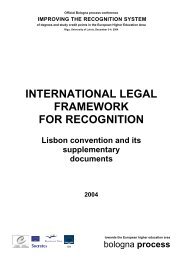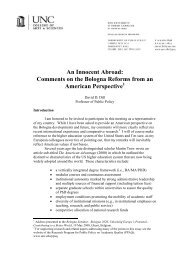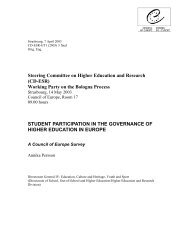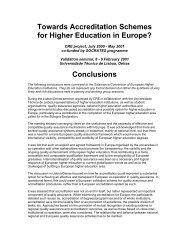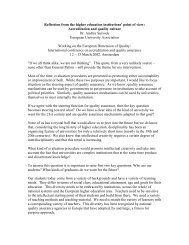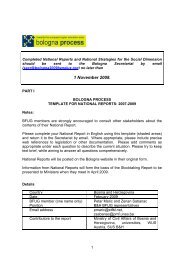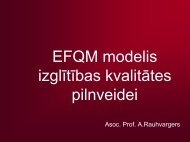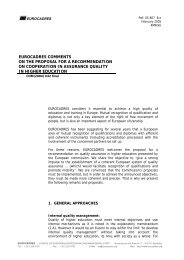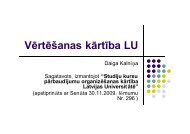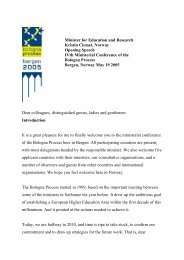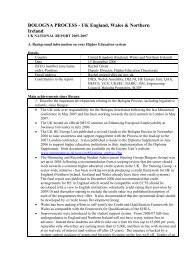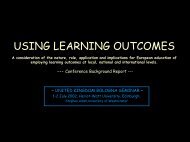EUA Survey Of Master Degrees In Europe - European University ...
EUA Survey Of Master Degrees In Europe - European University ...
EUA Survey Of Master Degrees In Europe - European University ...
You also want an ePaper? Increase the reach of your titles
YUMPU automatically turns print PDFs into web optimized ePapers that Google loves.
5The regulated professions• (ii) or, in the case of a regulated profession, training with a special structure, includedin Annex II, equivalent to the level of training provided for under (i), which provides acomparable professional standard and which prepares the trainee for a comparable level ofresponsibilities and functions. […]• (d) a diploma certifying successful completion of training at post-secondary level of at leastthree and not more than four years’ duration, or of an equivalent duration on a part-time basis,at a university or establishment of higher education or another establishment providing thesame level of training, as well as the professional training which may be required in addition tothat post-secondary course;• (e) a diploma certifying that the holder has successfully completed a post-secondary course ofat least four years’ duration, or of an equivalent duration on a part-time basis, at a universityor establishment of higher education or another establishment of equivalent level and, whereappropriate, that he has successfully completed the professional training required in additionto the post-secondary course.The Bologna <strong>Master</strong> may thus figure at level d or at level e, depending on the duration of theBachelor which precedes it.As they stand, the requirements of the Directive in relation to the general system are not calibratedin terms of ECTS; nor do they use the language of learning outcomes and level descriptors. Aneventual alignment of the Directive and Bologna will thus remove a powerful source of potentialconfusion. At the moment, national regulatory agencies are obliged to accept documentation whichis consistent with the Directive. The Diploma Supplement, the Dublin Descriptors, reference to theBologna cycles, the mobility instruments bundled into EUROPASS, useful though they may be forother purposes, are not consistent with the Directive.The Bologna Process and engineeringTable A shows that some countries have opted to retain the long integrated engineering qualification.The Bologna Process triggered a particularly agonised debate in England, where the four-year<strong>Master</strong> qualification (MEng) was felt to be vulnerable to perceptions that it was too short and thatit was not a second cycle degree. However, an emerging <strong>Europe</strong>an consensus has allowed ECUK,the Engineering Council of the UK, to become one of the first six national agencies to be allowedto award the EUR-ACE label to courses that it has accredited. The other agencies are the French,German, Irish, Portuguese and – thanks to a linked TEMPUS programme – the Russian ones.Given the widely differing traditions of engineering education in <strong>Europe</strong>, the success of the EUR-ACE label is significant. It has laid down framework standards for the accreditation of engineeringprogrammes. These specify learning outcomes at first and second cycle levels, allowing thepossibility that they may be attained in either discrete or integrated courses. Because the former lendthemselves more readily to the promotion of student mobility, it may still turn out that the providersof integrated courses will contemplate switching to 3+2 where national legislation permits.42EUR-ACE is managed by the <strong>Europe</strong>an Network for Accreditation of Engineering Education [ENAEE],which itself operates under the umbrella of the Fédération Européene d’Associations Nationalesd’<strong>In</strong>génieurs [FEANI]. FEANI also administers the EUR ING qualification, which requires seven years ofpreparation, including at least three years of theoretical education in a recognised HEI establishmentand two years of assessed engineering professional experience. The <strong>Europe</strong>an Commission endorsesthis title, without allowing it the status of a qualification within the meaning of the Directive. <strong>In</strong>2004, in answer to a Parliamentary question, it judged the FEANI scheme ‘an excellent example ofself-regulation by a profession at <strong>Europe</strong>an level and […] a model for other professional groups inthe technical and scientific sector, such as chemists and physicists.’



